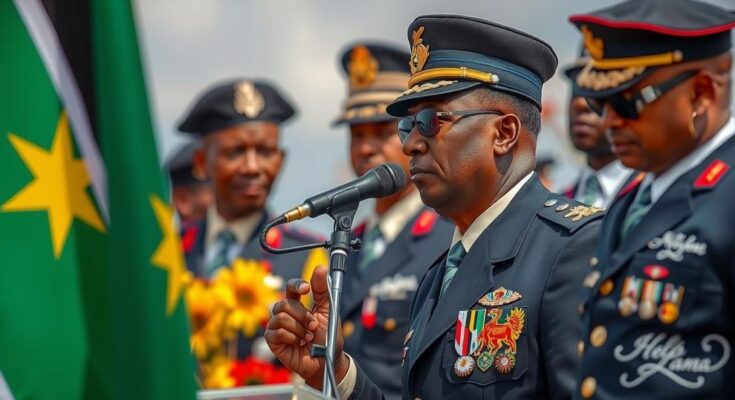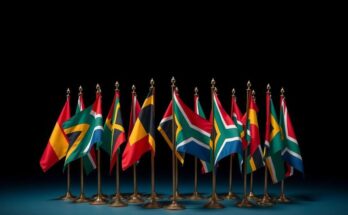Duma Boko was sworn in as Botswana’s new president on October 30, following a historic election victory by his UDC party, which ended nearly 60 years of BDP rule. Boko emphasized the significance of this democratic test and outlined his administration’s ambitious plans to address unemployment and economic diversification while calling for unity and participation from all citizens.
On October 30, Botswana ceremoniously inaugurated Duma Boko as its new president, marking a significant political shift following his decisive triumph in the recent elections. Boko’s Umbrella for Democratic Change (UDC) party overwhelmingly defeated the long-standing Botswana Democratic Party (BDP), which had governed since the nation gained independence in 1966. During the swearing-in ceremony at the national stadium, attended by thousands, Boko hailed this moment as a significant test of democracy and urged unity among the citizens to foster national development. In his inaugural speech, President Boko reflected on the historical context of Botswana’s democracy, stating, “For nearly three score years, our democracy remained unbroken, unproven and untested. On the 30th of October this year, together, we tested this democracy.” He emphasized that the UDC’s victory was a collective achievement for the people of Botswana, highlighting the active participation of younger voters, who represented about one-third of the over one million registered voters. The election saw a remarkable voter turnout of 80 percent, underscoring a strong desire for change from decades of BDP governance. The newly elected president outlined an ambitious vision for his administration, which includes addressing unemployment, economic inequalities, and the urgent need for diversification away from diamond dependency. Boko’s campaign promises included creating 500,000 new jobs, erecting 100,000 houses within five years, and making significant reductions to utility bills while ensuring healthcare coverage for all citizens. Additionally, the president remarked on the importance of stabilizing relationships with existing partners in the diamond sector to strengthen the economy. In the audience during the inauguration were former president Mokgweetsi Masisi, who accepted his defeat gracefully, and various leaders from neighboring southern African countries. Despite mixed reactions from the crowd towards Masisi, Boko praised him for his service, urging attendees to show appreciation. International observers, such as Zimbabwean opposition leader Nelson Chamisa, viewed Botswana’s transition as a beacon of hope for other nations facing authoritarian rule. Chamisa articulated, “Botswana is heralding an era of newness, an era of transformation, an era of effective transition,” emphasizing that the continent of Africa is in need of fresh, visionary leadership as it seeks progress and unity. The swearing-in of Duma Boko not only marks a new chapter in Botswana’s political landscape but also represents a broader push for democratic transitions within the region, calling for cooperative efforts to enhance governance and uplift communities across Africa.
The recent elections in Botswana have sparked a historical political transformation as Duma Boko assumes the presidency after a long tenure of leadership by the Botswana Democratic Party (BDP). The BDP ruled Botswana for nearly six decades following its independence in 1966 and faced growing public discontent due to mismanagement and inequality issues. The 2023 elections witnessed significant involvement from younger voters, reflecting a robust demand for change and renewed governance policies focusing on job creation and economic diversification.
The inauguration of President Duma Boko represents a pivotal moment in Botswana’s democratic journey and indicates a growing trend towards political renewal in the region. With ambitious goals set forth by the UDC, the new administration faces the challenge of revitalizing an economy historically reliant on diamond sales and addressing pressing social issues including unemployment and welfare access. The event symbolizes not only a national change but also a hopeful movement for democratic leadership across Africa.
Original Source: www.barrons.com




